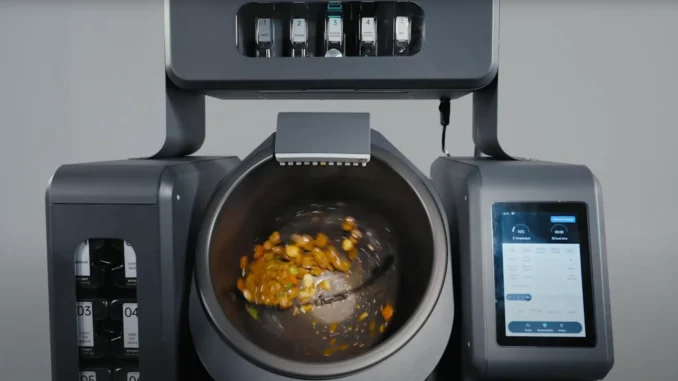
By Orit Naomi, RTN staff writer - 12 4.2024
Botinkit, a Shenzhen-based robotics company, has unveiled its AI-powered cooking robot, Omni. The company, co-founded in 2021 by Shirley Chen, secured $13 million in Series A funding in July 2023. The investment has fueled the development and deployment of Omni, a wok-shaped robot designed to automate and standardize cooking processes in commercial kitchens.
Unlike some robotics companies that focus on creating visually striking humanoid robots, Botinkit has prioritized a more practical approach. The Omni robot resembles a standard kitchen appliance, featuring a touchscreen interface for easy operation by human staff. This design prioritizes functionality and seamless integration into existing kitchen workflows.
The Omni system specializes in stir-frying and stewing, automating the complex techniques and precise timing required for these cooking methods. An optional add-on robotic arm further enhances automation by handling the addition of ingredients, freeing up human chefs to focus on other tasks. Botinkit claims the Omni system can reduce labor requirements in a typical 100-square-meter kitchen from six to ten staff members down to just one or two. This significant reduction in labor costs is a major selling point for restaurants facing staffing shortages and rising labor costs.
Beyond labor savings, Botinkit asserts that Omni offers other operational benefits, including a 30% reduction in ingredient loss and a 40% reduction in energy consumption compared to traditional gas stoves. These efficiencies are achieved through precise temperature control and automated ingredient dispensing, minimizing waste and optimizing resource utilization. The company is also developing a deep-fry module, expanding Omni’s capabilities and addressing another key area of restaurant cooking.
Botinkit’s technology also aims to facilitate restaurant expansion across different regions. Maintaining consistent food quality and training large numbers of kitchen staff are significant challenges for restaurant chains seeking to expand into new markets. Botinkit’s robots offer a solution by standardizing cooking processes and reducing reliance on human labor, enabling faster and more efficient scaling of operations.
Looking ahead, Botinkit is investing in advanced sensor technology. While its current robots utilize temperature sensors, the company is developing multimodal sensors that can detect flavors and smells. This research aligns with Botinkit’s long-term vision of leveraging artificial general intelligence (AGI) to create robots that can understand human preferences and refine cooking processes based on data feedback.
While Botinkit is one emerging robotics player in the restaurant technology space, particularly in Asia, other technology companies are also developing innovative robotic solutions for automating kitchen operations. Shenzhen Pudu Technology, for example, focuses on indoor delivery robots, while Jian24 has developed a checkout-free smart convenience store concept. Meiweishenghuo manufactures and supplies smart vending machines for fresh produce and prepared meals, and Ushi Retail offers self-driving delivery robots for outdoor use. While these companies offer different solutions, they all reflect the growing trend of automation and AI adoption within the food service and retail industries in Asia.
Botinkit’s focus on automating complex cooking processes with its Omni robot differentiates it from competitors like Miso Robotics, which specializes in burger-flipping robots. While Miso has secured partnerships with major fast-food chains in the US, Botinkit’s technology caters to a broader range of cuisines and cooking styles, particularly those common in Asian cuisine. The company’s client base includes fast-food chains, hotels, catering services, and supermarkets, with its robots already deployed in Walmart locations in China and Delibowl in Singapore.
While hardware sales currently generate the majority of Botinkit’s revenue, the company is also exploring new revenue streams, such as creating custom recipes for clients through its network of partnered chefs. This diversification of its offerings could further strengthen Botinkit’s position in the rapidly evolving restaurant technology market.

